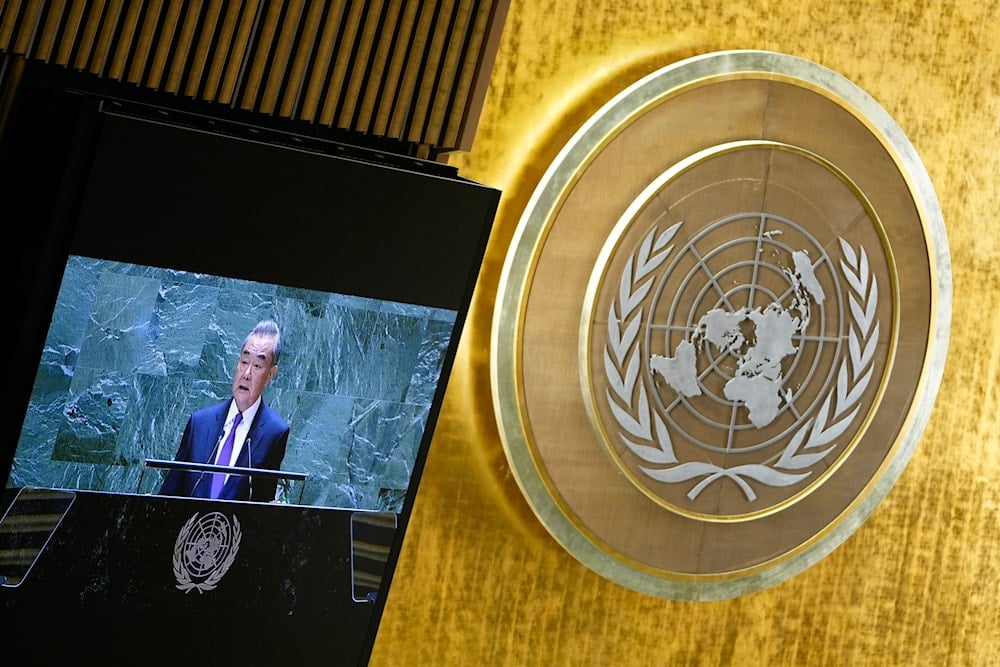US leaves power vacuum in UN, China jumps in to fill it
Beijing is accelerating its UN influence through diplomacy, funding, and strategic appointments, capitalizing on the void left by US retreat under Trump.
-

China's Minister for Foreign Affairs Wang Yi addresses the 79th session of the United Nations General Assembly, Saturday, Sept. 28, 2024 (AP)
Western diplomats told the Financial Times that China is actively working to expand its influence across the United Nations, leveraging Donald Trump’s aversion to multilateralism to appoint more officials and advance Beijing’s agenda more assertively.
Multiple officials and diplomats told the Financial Times that China has intensified efforts to fill the void left by reductions in US foreign aid, which triggered what may be the UN’s most significant restructuring in decades, particularly in Geneva, a key hub for diplomatic activity.
Multiple officials and diplomats told the Financial Times that China has expanded its presence by deploying more personnel, forming voting alliances, and in certain instances, boosting financial support to solidify its influence in Geneva, a city known as the "kitchen of global diplomacy" and home to over 450 international organizations.
Western officials told the Financial Times that China has shown particular interest in agencies, such as the International Telecommunication Union (ITU), responsible for establishing global communications standards, and the World Health Organization (WHO).
Beijing pours effort into expanding its influence
China has been steadily expanding its influence in Geneva's UN agencies for nearly a decade, particularly in those dealing with development, technology, and technical standards. While Beijing contributes over 15% of the UN's regular budget, second only to Washington's 22%, its representation among staff remains disproportionately low.
Research by Shing-hon Lam from the University of California and Courtney J. Fung from Macquarie University revealed that while China had approximately 1,600 UN staff members in 2022, far fewer than the US 5,000-plus, it has been actively developing new talent pipelines through internship programs to narrow this gap.
According to Western officials, China has intensified its efforts to expand UN influence following the Trump administration's withdrawal of US engagement, which created budgetary pressures that forced the United Nations to undertake significant structural reforms.
A senior Western official familiar with internal UN deliberations noted that China has been systematically increasing its role within the foundational bodies of the multilateral system, gradually leveraging this growing presence to reshape these institutions in alignment with its own geopolitical perspective and values.
China's push deconstructed
Lu Xiaoyu, a Peking University professor and former UN advisor, stated that China backs "necessary and equitable" UN reforms through the UN80 Initiative, emphasizing Beijing's push for "stronger representation for the global south, respect for national sovereignty, and a multilateral order" as part of its engagement with the international body.
A veteran UN diplomat based in Geneva observed that China has refined its approach to multilateral engagement, developing more nuanced strategies for building consensus through diplomatic negotiations and carefully calibrated compromises, which have significantly strengthened its current position within the international system.
A senior European diplomat observed that China has positioned itself as a neutral mediator, contrasting with Trump's combative foreign policy, while building substantial voting support across Africa and the Indo-Pacific.
EU officials have reportedly increased coordination with other Western governments to assume leadership roles traditionally held by the US, holding recent meetings in Geneva and Brussels to address what one diplomat described as the critical need for European powers to actively fill the emerging geopolitical void rather than ceding the space to Chinese influence.
Fierce competition
China secured the hosting rights for the 2027 World Radiocommunication Conference, the ITU's premier policy-setting event, with Shanghai selected as the venue following a late objection from the United States that ultimately failed to block the decision.
An EU official noted that positions within the International Telecommunication Union remain highly contested between the US and China, reflecting the ongoing geopolitical tensions within the organization.
The ITU, currently headed by American Doreen Bogdan-Martin, was previously led by China's Houlin Zhao, with the EU official pointing out that while the director-general position is now held by a US representative, China has successfully placed allies, particularly from African nations, in key leadership roles such as the Development Bureau's directorship.
China has expanded its influence in key UN positions beyond Geneva this year, with Chinese nationals being appointed to top UN representative posts in Botswana and the Maldives during May and June, marking a significant acceleration since the country's first such appointment in Namibia back in 2020.

 4 Min Read
4 Min Read










